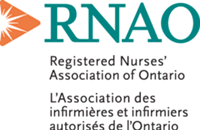Province's support of supervised injection services and overdose prevention services welcomed by RNAO
TORONTO, Oct. 22, 2018 /CNW/ - News that the province will allow sites offering supervised injection services (SIS) and overdose prevention services (OPS) to continue operating and expand is being welcomed by members of the Registered Nurses' Association of Ontario (RNAO).
At the media conference attended by RNAO today, Health Minister Christine Elliott announced the government's commitment to providing comprehensive access to services for those addicted to opioids. Elliott says she reviewed the evidence and saw firsthand the work being done by registered nurses and other health workers in combating the growing crisis. In response, she says her government is introducing a new delivery model rooted in overdose prevention and connecting those that are ready to access treatment.
"We are elated by this news. We never doubted the efficacy of these services. In fact, the evidence is categorical that SIS and OPS save lives. Now that the government has made its decision, registered nurses (RN), nurse practitioners (NP), and other health professionals can get on with the job of helping people that desperately need our help," says Angela Cooper Brathwaite, RNAO's president.
Existing sites offering SIS and OPS allow people to inject drugs under the supervision of trained RNs, NPs, and others who provide sterile supplies, information about the dangers of overdose, and other health and social support services. There are currently 16 sites offerings SIS and OPS across Ontario.
According to the government's own statistics, 1,261 Ontarians died in 2017 as a result of opioid poisoning. That's a 45 per cent jump over the previous year when 867 people died.
RNAO's CEO Doris Grinspun says the numbers point to the urgent need for these services. "Despite the best efforts of dedicated health professionals, the death toll continues to rise. That's how unrelenting this crisis is. The only way to stem this tide of rising deaths is to ensure we have enough people and resources to reach those in need."
London is an example of what is at stake. It was the first city in the province allowed to operate a sanctioned overdose prevention site. Since opening its doors in February, nurses and outreach workers have supervised more than 7,000 injections. Workers have been able to reverse 37 overdoses without any deaths. In addition to saving lives, staff members have connected 150 clients to treatment for addiction.
Grinspun says that she is pleased by the health minister's comments that the three sites that were "paused" by the government this summer - Thunder Bay, St. Catharines and Toronto - meet the criteria to apply and begin offering services once their applications are given the go ahead. "These are communities where a critical need has been identified, where funding is in place and they are ready to go," says Grinspun.
Grinspun credits the 3,205 nurses, other health professionals and members of the public who joined RNAO in writing letters to Premier Ford and Health Minister Christine Elliott imploring them to approve and fund these services. She also credits the premier for respecting and acting on the minister's recommendations.
RNAO is the professional association representing registered nurses, nurse practitioners, and nursing students in Ontario. Since 1925, RNAO has advocated for healthy public policy, promoted excellence in nursing practice, increased nurses' contribution to shaping the healthcare system, and influenced decisions that affect nurses and the public they serve. For more information about RNAO, visit RNAO.ca or follow us on Facebook and Twitter.
SOURCE Registered Nurses' Association of Ontario

To arrange an interview, please contact: Marion Zych, Communications Director, Registered Nurses' Association of Ontario (RNAO), 416-408-5605, 647-406-5605, [email protected]

Share this article